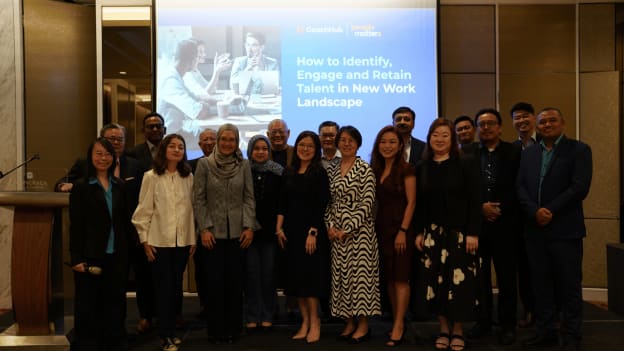Healthy level of attrition crucial for growth of young talent, say HR leaders: Insights from CoachHub Roundtable

The evolution of the world of work has significantly altered the employer-employee relationship in the last few years. As employees today seek greater work-life balance, better career progression, and more options to explore different experiences and industries, the talent landscape has witnessed a transition from long-term loyalty to flexibility and growth.
In an exclusive roundtable discussion, hosted by People Matters in association with CoachHub, senior leaders from across industries came together to dig deeper into the causes of rising attrition, the importance of empowering young managers through coaching and mentoring, and how the ‘best’ talent may not always be the ‘right’ talent.
Upskilling managers through coaching
Leaders at the roundtable, despite coming from a wide cross-section of industries from consulting to telecom to healthcare, unanimously agreed on the need to educate, upskill managers, especially the 'instant noodle' young ones as managers are the first line of contact with talent. This is an area in which personalised, measurable and scalable digital coaching programs can play a critical role.
Other ideas that were proposed during the discussion included:
-
Mentorship sessions with C-level executives for inspiration
-
Practising daily, weekly, monthly cadence of accountability
-
Working on challenges, feedback, review (CFR) that gives them foresight
-
Ensure young managers are aware of their role, responsibilities and expected results
-
Focus on soft skills especially important since they work closely with talent
It is important to remember that most issues with employees arise from inexperienced managers who may not be up to having the difficult, albeit important, conversations. HR has to do the work to prepare and develop them.
New perspective
Over the past few years, leaders have approached talent management and talent acquisition with a fresh perspective, prioritising employee expectations.
“Retention is a big issue in the manufacturing sector, which is an industry that no longer appeals to the young generation entering the workforce. New employees want to spend a few years, gain knowledge and experience and then move,” felt Prasad Chandran, Director Corporate Management Centre, Panasonic Industrial Devices.
Emphasising the need to change with the times and increase focus on digitisation, he said: “We are taking steps and introducing new practices such as flexi-hours, work from home and upskilling and training opportunities,”
“As we work towards providing employees with more flexibility and creating a global workforce, one of the biggest challenges we are facing is skills standardisation,” added Chandran.
Desirable level of attrition and stay interviews
Many speakers present at the roundtable agreed that attrition, to a certain level, is not only expected but also desirable as it allows for continual renewal of talent. Attrition also gives young talent room to grow.
At the end of the day, it is about retaining key talent and that is where HR should focus. Once key talent is identified, HR needs to work towards creating personalised growth roadmaps and providing employees with ample opportunities to better their skills. This can be through personalised coaching, access to relevant certifications and customised mentorship programs.
“Every company should have a benchmark for healthy attrition,” suggested Rodica Belocosov, VP People Operations, MoneyLion, adding that if employees stay beyond a certain period of time, organisations should focus on conducting stay interviews to understand what keeps them. Belocosov said it's important for managers to take time and understand the reasons why employees continue to stay on with the organisation while also providing such employees the opportunity to give valuable feedback that the organisation can work on.
Compensation = Flexibility
In today’s day and age, employees are giving equal importance to compensation and the flexibility to work from anywhere. It is critical for HR leaders to remember that – in most cases – the cost of replacing an employee is far higher than the cost of a pay increase.
It is time for organisations to not only be transparent in their conversations surrounding pay but also need to focus on providing employees with a flexible working setup that allows them to be engaged and efficient. Companies should actively work towards providing flexible work options by trying to meet the diverse needs of the workforce. For example, working mothers or single parents may need more organisational support and flexible working options.
Taking the lead
The modern employee is not afraid of testing the waters when they feel like they aren't being compensated well or don't have the right work environment to flourish. In this context, what timely steps can managers take to ensure all-round satisfaction before an employee reaches the point where they want to leave?
Compensation offered to employees must systematically and regularly be benchmarked against what's in the market. Managers can pre-empt someone’s exit by reviewinging, benchmarking and adjusting compensation every year. Another step that can be taken is when an employee decides to leave, counter offering on role, rather than salary.
On the need to be aware of the impact the pandemic had on the workforce, Norhanifah A Jalil, Chief Human Resource Officer, Permodalan Nasional Berhad said, “Keep in mind what people went through during Covid and how working remotely can be a lot more tiring than working from office because of blurred boundaries.”
Talent needs challenges to thrive
Another interesting aspect to the discussion was how even though organisations go out on a limb to recruit what they deem to be the ‘best’ talent, it may eventually backfire.
This is because ‘best’ talent may not always be the ‘right’ talent, especially for specialised industries like healthcare. Young talent needs extra attention to develop, they need challenges, and they need expert guidance to ‘level up’ – if not planned for during recruitment, this can pose issues when it comes to retention.
The flipside
To balance out the conversation, the managers’ side of the talent retention and attrition issue was also discussed at length. Leaders realise that managers are not solely responsible for the employer-employee relationship. It is the HR function's job to create the right platform and environment for managers to be able to manage well. They can do this through training and skilling initiatives. Few steps can be taken:
-
Identify - We cannot blindly call someone ‘talent’, they must be someone who can actively contribute towards organisational success
-
Engage - The right employee-employee conversations must take place in a structured manner to create an environment where superior and subordinate can talk freely
-
Retain - To figure out whether an employee should be retained or not, managers should be equipped to ask and answer the right question: Whether talent is still adding value to the organisation?
Here are some key takeaways from the roundtable discussion
1) In a fast-changing work environment, attrition is becoming not only inevitable but, to a certain degree, desirable. Leaders need to ask themselves: Who should we invest effort into when trying to retain?
2) Coaching can play an important role in growth of young talent, especially coaching programs that are not only specialised but are customised as per an employee’s requirements.
3) Since managers are the first line of contact with talent. They need to be upskilled and educated, especially if they are new to the role so that they, and by extension, the organisation, will be aware of unexpected attrition.
3) HR plays a critical role in supporting managers and creating an environment that encourages engagement by giving superiors and subordinates the space and opportunity to communicate, irrespective of the outcome of the conversation.
















